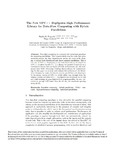Mostrar o rexistro simple do ítem
The New UPC++ DepSpawn High Performance Library for Data-Flow Computing with Hybrid Parallelism
| dc.contributor.author | Fraguela, Basilio B. | |
| dc.contributor.author | Andrade, Diego | |
| dc.date.accessioned | 2022-06-27T15:22:39Z | |
| dc.date.issued | 2022 | |
| dc.identifier.citation | Fraguela, B.B., Andrade, D. (2022). The New UPC++ DepSpawn High Performance Library for Data-Flow Computing with Hybrid Parallelism. In: Groen, D., de Mulatier, C., Paszynski, M., Krzhizhanovskaya, V.V., Dongarra, J.J., Sloot, P.M.A. (eds) Computational Science – ICCS 2022. ICCS 2022. Lecture Notes in Computer Science, vol 13350. Springer, Cham. https://doi.org/10.1007/978-3-031-08751-6_55 | es_ES |
| dc.identifier.uri | http://hdl.handle.net/2183/31002 | |
| dc.description | This versión of the contribution has been accepted for publication, after peer review but is not the Version of Record and does not reflect post-acceptance improvements, or any corrections. The Version of Record is available online at: https://doi.org/10.1007/978-3-031-08751-6_55. Use of this Accepted Version is subject to the publisher’s Accepted Manuscript terms of use https://www.springernature.com/gp/open-research/policies/accepted-manuscript-terms | es_ES |
| dc.description.abstract | [Abstract] Data-flow computing is a natural and convenient paradigm for expressing parallelism. This is particularly true for tools that automatically extract the data dependencies among the tasks while allowing to exploit both distributed and shared memory parallelism. This is the case of UPC++ DepSpawn, a new task-based library developed on UPC++ (Unified Parallel C++), a library for parallel computing on a Partitioned Global Address Space (PGAS) environment, and the well-known Intel TBB (Threading Building Blocks) library for multithreading. In this paper we present and evaluate the evolution of this library after changing its engine for shared memory parallelism and adapting it to the newest version of UPC++, which differs very strongly from the original version on which UPC++ DepSpawn was developed. As we will see, while keeping the same high level of programmability, the new version is on average 9.3% faster than the old one, the maximum speedup being 66.3%. | es_ES |
| dc.description.sponsorship | This research was supported by the Ministry of Science and Innovation of Spain (PID2019-104184RB-I00/AEI/10.13039/501100011033), and by the Xunta de Galicia co-founded by the European Regional Development Fund (ERDF) under the Consolidation Programme of Competitive Reference Groups (ED431C 2021/30). We acknowledge also the support from the Centro Singular de Investigación de Galicia “CITIC”, funded by Xunta de Galicia and the European Union (European Regional Development Fund- Galicia 2014–2020 Program), by grant ED431G 2019/01. Finally, we acknowledge the Centro de Supercomputación de Galicia (CESGA) for the use of their computers | es_ES |
| dc.description.sponsorship | Xunta de Galicia; ED431C 2021/30 | es_ES |
| dc.description.sponsorship | Xunta de Galicia; ED431G 2019/01 | es_ES |
| dc.language.iso | eng | es_ES |
| dc.publisher | Springer | es_ES |
| dc.relation | info:eu-repo/grantAgreement/AEI/Plan Estatal de Investigación Científica y Técnica y de Innovación 2017-2020/PID2019-104184RB-I00/ES/DESAFIOS ACTUALES EN HPC: ARQUITECTURAS, SOFTWARE Y APLICACIONES/ | |
| dc.relation.uri | https://doi.org/10.1007/978-3-031-08751-6_55 | es_ES |
| dc.subject | Data-flow computing | es_ES |
| dc.subject | Hybrid parallelism | es_ES |
| dc.subject | PGAS | es_ES |
| dc.subject | Runtimes | es_ES |
| dc.subject | High-performance computing | es_ES |
| dc.subject | Task-based parallelism | es_ES |
| dc.title | The New UPC++ DepSpawn High Performance Library for Data-Flow Computing with Hybrid Parallelism | es_ES |
| dc.type | info:eu-repo/semantics/conferenceObject | es_ES |
| dc.rights.access | info:eu-repo/semantics/embargoedAccess | es_ES |
| dc.date.embargoEndDate | 2023-06-15 | es_ES |
| dc.date.embargoLift | 2023-06-15 | |
| UDC.journalTitle | Lecture Notes in Computer Science | es_ES |
| UDC.volume | 13350 | es_ES |
| UDC.startPage | 761 | es_ES |
| UDC.endPage | 774 | es_ES |
| dc.identifier.doi | 10.1007/978-3-031-08751-6_55 | |
| UDC.conferenceTitle | Computational Science – ICCS 2022 | es_ES |






